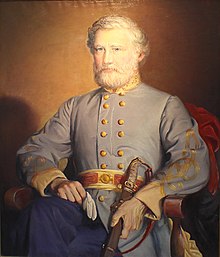Henry L. Benning
| Henry L. Benning | |
|---|---|

Portrait of Gen. Henry Lewis Benning by Bjorn Egeli
|
|
| Birth name | Henry Lewis Benning |
| Nickname(s) | "Old Rock" |
| Born |
April 2, 1814 Columbia County, Georgia, U.S. |
| Died | July 10, 1875 (aged 61) Columbus, Georgia, U.S. |
| Buried at | Linwood Cemetery Columbus, Georgia, U.S. |
| Allegiance |
|
| Service/branch |
|
| Years of service | 1861–1865 |
| Rank |
|
| Unit | "Benning's Brigade" |
| Commands held |
|
| Battles/wars | |
| Spouse(s) | Mary Howard Jones (m. 1839) |
| Relations | 10 children |
Henry Lewis Benning (April 2, 1814 – July 10, 1875) was a general in the Confederate States Army. He also was a lawyer, legislator, and judge on the Georgian Supreme Court as a native Georgian. He commanded the "Benning's Brigade" during the American Civil War. Following the Confederacy's defeat at the end of the war, he returned to his native Georgia, where he lived out the rest of his life. Fort Benning Georgia, home of the Maneuver Center of Excellence (MCoE) is named after him.
Benning was born on a plantation in Columbia County, Georgia, the son of Pleasant Moon and Malinda Meriwether White Benning, the third of eleven children. He attended Franklin College (now the University of Georgia), graduating in 1834. While a student, he was a member of the Phi Kappa Literary Society. After college, he moved to Columbus, Georgia, which would be his home for the rest of his life. He was admitted to the bar at the age of 21.
Benning was active in Southern U.S. politics and an ardent secessionist, bitterly opposing abolition, the emancipation of slaves, and equality for African Americans. In a letter to Howell Cobb written in July 1849, he stated that a Southern Confederacy would not be enough—because a Confederacy might itself eventually become divided into northern and southern regions as slavery waned in some of the states—and called for a Southern "consolidated Republic" that "will put slavery under the control of those most interested in it."
...
Wikipedia
